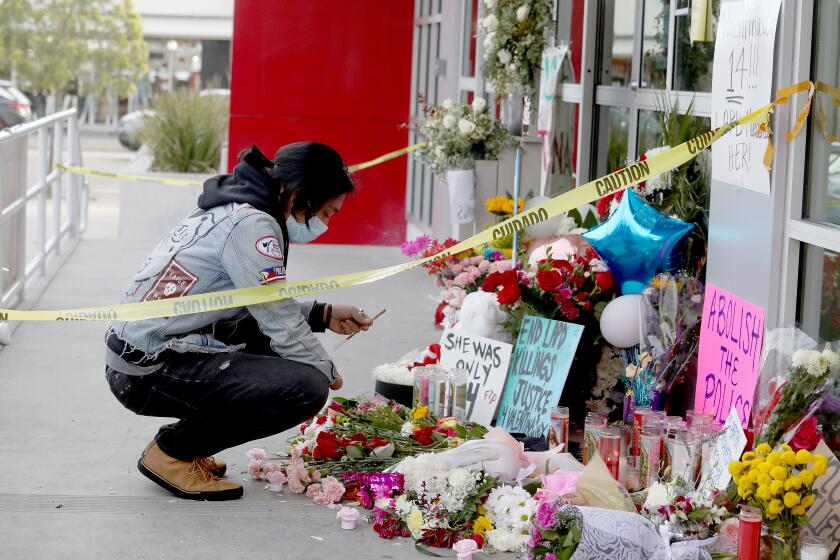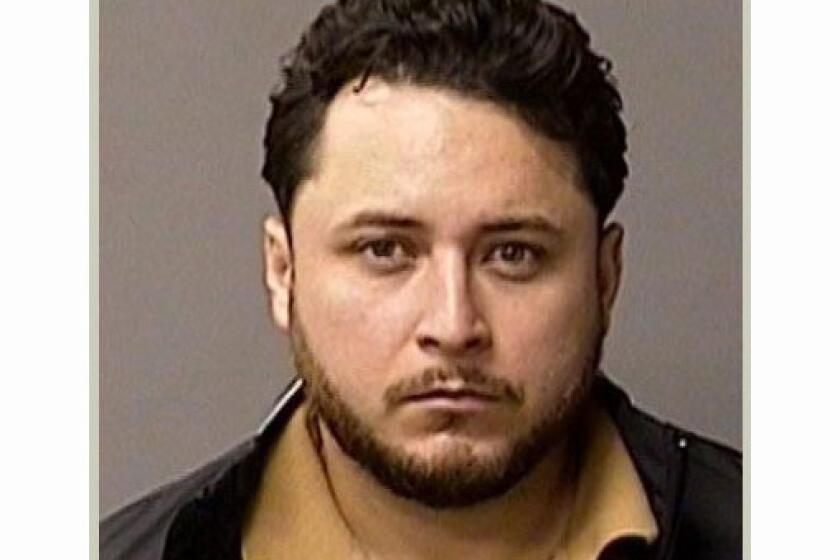Victim-photo ruling is reversed
In a unanimous decision, the Supreme Court reversed the U.S. 9th Circuit Court of Appeals on Monday and restored a California man’s murder conviction, saying his rights were not violated when the victim’s family wore a small photo of the victim during the trial.
It was the high court’s second reversal of the San Francisco-based court in the last 30 days.
This time, the nine justices said the court went too far when it overturned Mathew Musladin’s conviction for killing Tom Studer in San Jose in 1994.
The appellate decision had outraged victim’s rights advocates, who said families of victims should not be penalized for courtroom displays of grief.
The high court’s opinion did not set new rules on what spectators may say or do during a trial.
In a short opinion, the justices said they had overruled the appeals court because it had overstepped its authority. Ten years ago, Congress limited the power of federal judges, saying they could not create new constitutional rights when reviewing state convictions. Only the Supreme Court could set a “clearly established” right. In Monday’s opinion, the court said it had never found a right for defendants to be protected from “spectator conduct” during a trial.
Kent Scheidegger, a lawyer for the Criminal Justice Legal Foundation in Sacramento, called the 9th Circuit’s ruling “a prime example of exactly the kind of interference with state courts that Congress intended to prohibit.”
Vikram Amar, a professor at UC Hastings College of Law in San Francisco, said it was notable that even the court’s liberal justices rejected the 9th Circuit’s decision. “This was an easy case for the Supreme Court,” he said.
Monday’s decision was greeted with relief by a brother of the murder victim.
“Our family is pretty excited and happy with how this turned out,” said Jim Studer, an assistant school principal in Reno. “It was important this was a unanimous decision.”
Last month, in their first decision of the new term, the justices overturned the 9th Circuit and restored a death sentence for a Central Valley man who had beaten and killed a young woman in 1981.
Both reversed opinions were written by Judge Stephen Reinhardt of Los Angeles.
There was no dispute that Musladin shot and killed Studer in the driveway of his estranged wife’s home on May 13, 1994.
He and his wife fought, and he threw her to the ground. Studer, who was her fiance, and her brother came running.
Musladin pulled out a .45-caliber gun and began shooting. At his trial, Musladin said he had acted in self-defense.
The jurors found him guilty of first-degree murder and attempted murder. He was sentenced to 32 years in prison.
Last year, the 9th Circuit overturned Musladin’s conviction on a 2-1 vote on the grounds that Studer’s parents and brother had attended the trial wearing badges with photos of him in his Navy uniform.
Reinhardt, writing for the appeals court, said these photos “conveyed the message the defendant was guilty” and violated his right to a fair trial.
The state judge who had presided at the trial had allowed Studer’s family to wear the photos, saying he saw “no possible prejudice to the defendant.”
A California appeals court agreed. Its judges said photos, ribbons or badges in the courtroom should be discouraged, but the “simple photograph of Tom Studer was unlikely to have been taken as a sign of anything other than the normal grief occasioned by the loss of a family member.”
A federal district judge also rejected Musladin’s claim of an unfair trial. But the 9th Circuit ruled Musladin was entitled to a new trial or to be set free.
*
An improper conclusion
In writing the Supreme Court opinion, Justice Clarence Thomas cited a 1996 law that said federal judges can upset convictions only when state courts have ignored a violation of “clearly established law” as set by the high court.
The only Supreme Court decisions on courtroom conduct have dealt with “government-sponsored practices.” In 1976, for example, the court said requiring the defendant to wear prison clothes at his trial was “inherently prejudicial.”
By contrast, the Musladin case involves “spectator conduct,” Thomas said.
“This court has never addressed a claim that such private-actor conduct was so inherently prejudicial that it deprived a defendant of a fair trial,” he said in Carey vs. Musladin. Therefore, he said, the 9th Circuit “improperly concluded” that the Studer family’s photo buttons violated a clearly established right.
Chief Justice John G. Roberts Jr. and Justices Antonin Scalia, Ruth Bader Ginsburg, Stephen G. Breyer and Samuel A. Alito Jr. agreed. The other three justices concurred in separate opinions.
It is not clear why the justices chose not to rule on the issue of photos or displays in the courtroom. However, Roberts has said that he prefers the court to issue narrow, unanimous rulings whenever possible.
Justice David H. Souter said he remained troubled by the photos. They are “an appeal for sympathy for the victim,” he said. However, “I would find it hard to say the state judges were unreasonable in this case.” Justice John Paul Stevens agreed.
*
Still no line drawn
Though agreeing that Musladin’s trial was not “tainted by an atmosphere or coercion or intimidation,” Justice Anthony M. Kennedy said there was a need for a rule on what behavior is allowed in courtrooms.
Ray Mendoza, a deputy district attorney in Santa Clara County who prosecuted the case, said, “I’m extremely relieved for the family, and I’m pleased this sends a clear message the 9th Circuit was wrong.”
He agreed judges must strictly limit displays in a courtroom.
“If the buttons had said, ‘Hang Musladin’ or ‘Free Musladin,’ that would have been prejudicial,” he said. “But these small buttons had no effect on the jury. This was a very strong case.”
*
More to Read
Start your day right
Sign up for Essential California for news, features and recommendations from the L.A. Times and beyond in your inbox six days a week.
You may occasionally receive promotional content from the Los Angeles Times.







